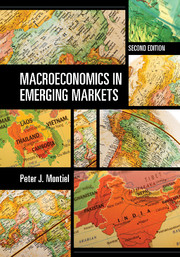Crossref Citations
This Book has been
cited by the following publications. This list is generated based on data provided by Crossref.
Aziakpono, M J
2013.
Financial Integration and Economic Growth: Theory and a Survey of Evidence.
Studies in Economics and Econometrics,
Vol. 37,
Issue. 3,
p.
61.
Lubinski, Christina
and
Kipping, Matthias
2015.
Introduction: Translating potential into profits: foreign multinationals in emerging markets since the nineteenth century.
Management & Organizational History,
Vol. 10,
Issue. 2,
p.
93.
Duncan, Roberto
2015.
A Simple Model to Teach Business Cycle Macroeconomics for Emerging Market and Developing Economies.
The Journal of Economic Education,
Vol. 46,
Issue. 4,
p.
394.
Hussein, Jwan
and
Benhin, James
2015.
Public and Private Investment and Economic Development in Iraq (1970-2010).
International Journal of Social Science and Humanity,
Vol. 5,
Issue. 9,
p.
743.
Piergallini, Alessandro
2015.
External Debt and Stabilizing Macroeconomic Policies.
Theoretical Economics Letters,
Vol. 05,
Issue. 06,
p.
720.
Araujo, Jorge Thompson
Vostroknutova, Ekaterina
Brueckner, Markus
Clavijo, Mateo
and
Wacker, Konstantin M.
2016.
Beyond Commodities: The Growth Challenge of Latin America and the Caribbean.
p.
75.
Lojanica, Nemanja
and
Tubić-Ćurčić, Tijana
2019.
Economic growth and economic inequality in Visegrád countries: Empirical analysis.
Skola biznisa,
p.
35.
Pilipenko, Zoya A.
2019.
Modeling Economic Growth in Contemporary Russia.
p.
29.
2020.
An Introduction to International Economics.
p.
283.
2020.
An Introduction to International Economics.
p.
232.
2020.
An Introduction to International Economics.
p.
145.
2020.
An Introduction to International Economics.
p.
97.
2020.
An Introduction to International Economics.
2020.
An Introduction to International Economics.
p.
44.
2020.
An Introduction to International Economics.
p.
121.
2020.
An Introduction to International Economics.
p.
80.
2020.
An Introduction to International Economics.
p.
334.
2020.
An Introduction to International Economics.
p.
355.
2020.
An Introduction to International Economics.
p.
256.
2020.
An Introduction to International Economics.
p.
60.





